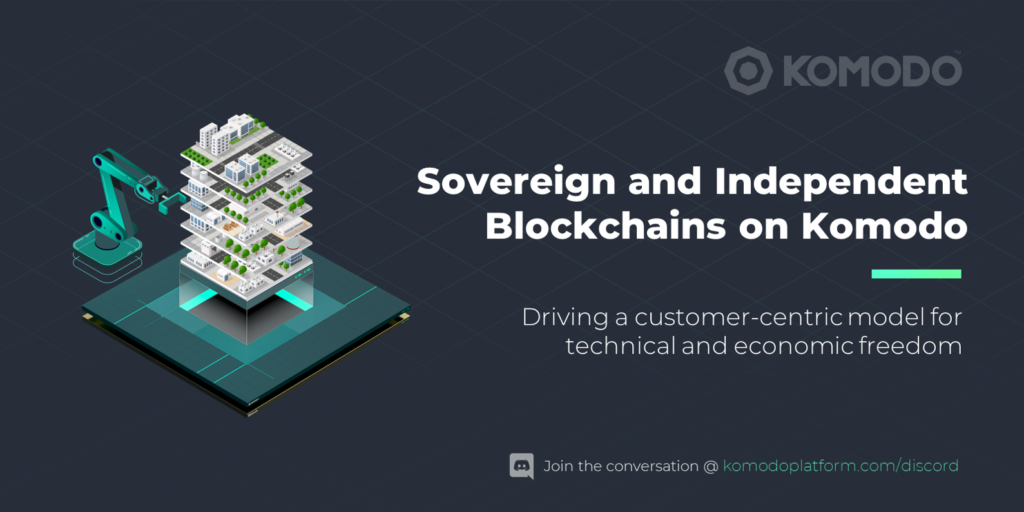Blockchain sovereignty is a relatively new concept in the industry.

Today, most projects are built on top of a large blockchain like Ethereum, and do not use a separate chain. Despite many shortcomings, this approach has been the easiest way to build a blockchain-based project for years. However, the landscape is changing. With the rise of multi-chain platforms, sovereignty will become an important issue.
Ideally, a blockchain should be sovereign both in terms of its technology and its economic model. It has to be able to fully function without relying on a main chain or external validators, while maintaining security and blockchain interoperability. It also needs to be independent from the token or coin of the larger ecosystem. These ideals are very hard to achieve, especially in a public, permissionless environment.
Antara Smart Chains do not need to connect to a main chain to operate and they are fully independent in their economic model. Komodo is the first to offer fully sovereign blockchains to all projects building on the platform. To understand the significance of this, we should take a look at the technological constraints and the flawed economic models other projects failed to overcome.
Overcoming the technological constraints
Solving the security problem
In a permissionless environment, decentralization and security go hand-in-hand. A project using a fully sovereign blockchain is initially vulnerable because of the small number of nodes maintaining the chain.
For this reason, many blockchain projects started building on Ethereum instead of creating their own blockchain. An established chain like Ethereum provides immediate security. Many multi-chain platforms offer a similar model: application-specific chains are connected to and secured by a relay chain.
Komodo views this approach as a “bug” rather than a “feature.” Multi-chain platforms simply can’t offer sovereign chains because without the added security of a relay chain, the risk of a successful attack would be unacceptably high.
Komodo solved this problem years ago with the Delayed Proof-of-Work (dPoW) security mechanism. A block hash from every Smart Chain is saved onto the Komodo chain using the OP_RETURN command, and every 10 minutes a block hash from the Komodo chain is written onto the Bitcoin ledger. To compromise a Smart Chain, the attacker has to take down both the Komodo chain and the Bitcoin blockchain itself, which is unfeasible.
This might look similar to a relay chain-based model, but it is fundamentally different. Any Komodo-based Smart Chain can add Delayed Proof-of-Work to their code base, as it is fully open source. Smart Chain projects can also set up their own notary node network and start notarizing to Komodo without permission or additional costs (other than simple transaction fees). The Komodo team wouldn’t even be aware of a sovereign chain using dPoW— and ultimately Bitcoin— as a security layer.
Interoperability without intermediaries
Both multi-chain platforms and Ethereum’s Plasma architecture offer some degree of interoperability— an exchange of assets between chains or sidechains. However, these solutions all rely on an intermediary, a relay chain, or a series of smart contracts. These platforms can’t offer fully sovereign blockchains, because it would prevent blockchain interoperability.
Komodo has recently introduced the world’s first asset-agnostic atomic swap framework, making intermediaries obsolete. All Smart Chains can use atomic swaps, exchanging value within the ecosystem (between other Smart Chains) or across protocols (Bitcoin, ERC-20 tokens, etc). Komodo-based Smart Chains are fully sovereign as they do not need to access or even be aware of the Komodo main chain to perform atomic swaps.
Fixing the flawed economic model
Rent-based models
Some blockchain platforms, such as Polkadot, employ a rent-based model, where projects have to buy and stake a significant amount of ecosystem tokens to rent a “parachain.” These tokens have to be locked the entire time, or otherwise the chain stops functioning.
The Komodo team believes rent-based models are self-defeating and contrary to the ethos of the blockchain industry. Blockchains are ultimately “trust machines” designed to get rid of intermediaries -- so why would we trade one rent-seeking middleman for another? This is the exact opposite of sovereignty.
Polkadot might be cutting-edge technology, but we believe its economic model is fundamentally broken, which will hinder the growth of its own ecosystem.
Gas-based models
The concept of “gas” is not inherently dishonest; it’s simply flawed.
The community around Ethereum, the platform that most famously uses a gas model, is well aware of the flaws. This is partly the reason why development shifted to Layer 2 solutions like Plasma. Applications and users don’t need to pay gas fees for sidechain transactions, but this comes with trade-offs around security.
The gas model looks even more unsustainable when it comes to smart contracts. Smart contract operations are expensive, and “optimizing for gas” is a constant struggle for Solidity developers. It is difficult to build complex business applications on the public Ethereum network, and there is no long-term solution in sight.
The gas model of Cosmos is somewhat better, as validators can theoretically accept any token. But in order to run a truly sovereign blockchain you need to set up your own application-specific chain (Zone) and also your own main chain (Hub), which is far from ideal.
Komodo’s solution
Komodo fixes the flawed gas model in two ways.
First, Antara Modules run directly on the network’s nodes themselves, and not on-chain. Using smart contract-like logic costs the fee of a single transaction, regardless of the difficulty of the task, or the resources used during the operation. This eliminates gas, and makes it possible to profitably run complex applications.
Second, all fees are paid using the own token of each Smart Chain. The operation of a Smart Chain does not depend on paying external validators.
Smart Chains are economically independent from the Komodo main chain. Projects do not need to buy, hold, stake or spend KMD to run a sovereign chain.
The Future is Multi-Chain
We believe in a future with millions of sovereign blockchains working together to perform any complex task previously impossible to decentralize. This vision requires sovereign blockchains, otherwise we are going to run into scaling challenges, or even worse, we will be building decentralized systems on centralized platforms.
📧Komodo Newsletter
If you'd like to learn more about blockchain technology and keep up with Komodo's progress, subscribe to our newsletter. Begin your blockchain journey with Komodo today.
